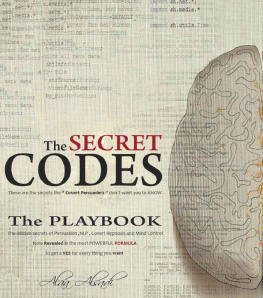Street
Hypnosis
George Hutton
mindpersuasion.com
MindPersuasion
Contents
Why Street Hypnosis?
In the world of hypnosis, we can think of two broad categories. Direct hypnosis, and indirect hypnosis. For a long time, there was only direct hypnosis. Everybody knew what was happening. The hypnotist, the person being hypnotized, and everybody watching. This worked for a while. But then therapists started to realize that people coming in, even knowing they were being hypnotized, would resist. Maybe they were scared of what they might find inside their own brain. Maybe they didn't quite trust the hypnotist a hundred percent. So, they'd pretend to be hypnotized. Closed their eyes and pretended to follow along. Plenty of hypnotists went along with this, not really minding so long as they were getting paid. But a few who wanted to help their patients and wanted to know why, despite being relaxed seemingly following all the hypnotists commands, weren't getting any better. So, a clever hypnotist invented another form of hypnosis. Indirect, or conversation (sometimes called covert) hypnosis. The kind where the patient doesn't really need to know she's being hypnotized.
Covert Hypnosis
This opened a whole new world of possibility. It wasn't long before this linguistic magic was discovered and taught to others. Soon people were teaching seminars to other therapists. Before long this started to be applied outside of therapy, namely in sales. After all, a sales meeting between the buyer and seller is very much like a meeting between doctor and patient. The buyer wants something (the product or something similar) but there are some things that are making it difficult to get (usually the price). This allowed some clever salespeople to make a lot more money. After sales, this type of hypnosis was used in other areas.
The Street
The street is where only the most skilled survive. If a patient is talking to a doctor, they've agreed to a mutual set of rules. When a salesperson is talking to a client, they are operating within an environment with certain expectations. When you walk into a store, you have an expectation of talking to a salesperson who is going to try and sell you something. If you are a woman, and you walk into a nightclub where guys go to meet girls, you have an expectation (even if you don't have the desire) of some guy coming and trying to get you interested in him. But on the street, there are no rules. Street fighting is understood to be much more dangerous than boxing or even cage fighting, where there are explicit rules. Learning direct hypnosis is one thing. You memorize a script, and then spit it out word for word. Learning covert hypnosis is more difficult, but most people use this in settings with certain expectations. Therapy, sales and seduction all come with a pre-built set of communication styles that both people can prepare for. Just like boxing or cage fighting. But street hypnosis is very much like street fighting. There are no rules.
Ethics
This opens a necessary question of ethics. The techniques you learn in this guide are very powerful, and can be used to have a lot of fun, or they can be used to cause a lot of damage. Just because you can do something, and get away with it, doesn't mean you should. You can go to Home Depot and buy a set of tools and some lumber to build a playhouse for your children. You can also use that same set of tools and that same lumber to build a torture device in your basement. These techniques are great party tricks, and can turn an otherwise normal day for a waitress or bartender into a wonderful and memorable exchange. You can also use these to fog somebody's mind so badly they can't make correct change the rest of the day and get fired from their job. Many believe techniques like these shouldn't be taught at all. However, that idea, that only select people should know certain technology is very dangerous in and of itself. Please use these techniques carefully, and make sure you follow the simple rule of always intending to leave people better than when you found them. If you absolutely need to use these destructively, consider them no differently than martial arts. While many people study martial arts for years or even decades without ever intending to use them outside of tournaments and practice, knowing that you can use them defensively is a comfort, and gives you much more confidence. Consider these patterns and techniques the same way. Use them for fun, use them to bring smiles to people's faces, and have the confidence that comes with knowing you can use defensively should the need arise.
Communication Flexibility
A great side benefit of studying these techniques, even if it's just for fun, is they will give you much more flexibility in your communication. Instead of only having one response (or none at all!) in any situation, you'll feel much more resourceful, and this itself will give you much more confidence. It will be nearly impossible to back you into a corner verbally. You'll be a lot better communicator in general. If you only have one way of saying something and people don't quite get what it you're attempting to convey, it's easy to get stuck. But when you can come at the same situation from plenty of angles, you'll never be at a loss again.
What's Ahead
Before we get into the techniques themselves, it will help to understand how they work. We'll take a brief survey of the human mind, and understand it's strengths and weaknesses. Then we'll get in to the various components that make up the patterns. Then we'll go through the patterns themselves and try them out in different hypothetical environments. Finally, we'll go over the best ways to practice these, and the most useful mindsets and beliefs to hold while delivering these. While it may be a lot to take in at once, give these techniques plenty of time. Their benefits are enormous, and you will greatly enjoy their use, as will the people you communicate with.
How the Mind Works
Our minds were developed in a very harsh environment. It was better to think more quickly than more accurately. Those that had to sit around and contemplate every decision ended up getting eaten by predators before they could reproduce. Those that ran away first and wondered why later are the ones that survived, and we are all descended from them. Consequently, our brains are very fast, but not very accurate. Even most of our memories are false. Study after study shows that when several people see an unexpected event, there is a lot of discrepancy in the recalled event only hours later. Even students who know the contents of a test and spend time purposely studying have trouble remembering! This is one example of how our minds are very reactive, and to become purposely proactive, it takes quite a bit of preparation. This gives a budding street hypnotist like you plenty of wonderful windows in which to slip your ideas. In this chapter, we'll go over some of these windows.
Deletions
Imagine you saw a fantastic movie on your favorite streaming service. It had plenty of your favorite actors and was made five years ago, yet you'd never heard of it. So, you watched it with great interest. The next day at work, your friend asks what you did last night.
"Dude," you reply excitedly, "I saw this awesome movie about these bank robbers!"
"Yeah?" Says your friend, looking up from the gurgling coffee pot in the break room.
"Yeah!" you reply, mentally recalling your favorite scenes.
"So, bank robbers?" your friend asks, looking back at the filling coffee pot.
"Yeah, but it was like, it had a different angle," you reply. The movie was pretty standard, but it was still awesome at the same time. Yet, you can't actually describe exactly WHY it was so awesome.
Next page





